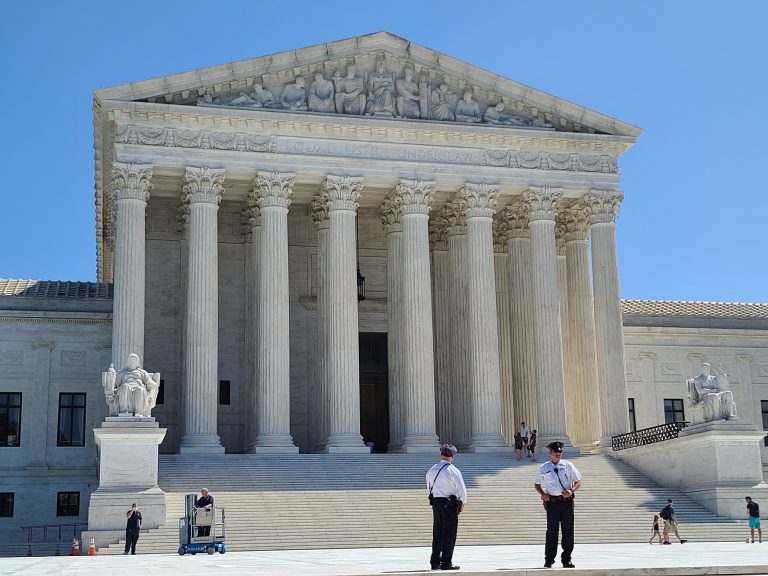A new federal appeals court ruling has widened the circuit split among courts grappling with whether felons can be permanently disarmed. That may force the Supreme Court to weigh in soon.
On Tuesday, a three-judge panel for the Eleventh Circuit Court of Appeals unanimously rejected a previously convicted drug trafficker’s challenge to 18 U.S.C. § 922(g)(1), the federal ban on felons possessing firearms. The panel determined that the Supreme Court’s New York State Rifle & Pistol Association v. Bruen decision did not upset its precedent upholding the federal felony gun ban’s validity.
“Because the Supreme Court ‘made it clear in Heller that [its] holding did not cast doubt’ on felon-in-possession prohibitions, and because the Court made it clear in Bruen that its holding was ‘[i]n keeping with Heller,’ Bruen could not have clearly abrogated our precedent upholding section 922(g)(1),” Judge William Pryor, a George W. Bush appointee, wrote in US v. Dubois. “Indeed, the Bruen majority did not mention felons or section 922(g)(1).”
The ruling makes the Eleventh Circuit the latest court to weigh in on the question, but it is far from the first to issue a decision on the constitutionality of § 922(g)(1) in light of Bruen.
In the less than two years since that opinion was handed down—reorienting the way courts analyze Second Amendment cases in the process—the Fifth, Eighth, and Tenth Circuits have all issued opinions upholding the federal ban. On the other hand, the Third Circuit last June ruled the ban unconstitutional as applied to a particular non-violent felon. Meanwhile, though it has not yet had the opportunity to opine on the legal merits of the ban, the Seventh Circuit also vacated and remanded a lower court decision upholding it with instructions to perform a more thorough Bruen analysis.
The bulk of the court decisions to date have upheld the ban, but the existence of a circuit split and the growing minority of lower court rulings striking it down highlights the uncertainty at play. Even among the courts that have agreed to uphold it, each case’s rationale has looked different.
The Fifth Circuit, for instance, has only weighed in on the legality of the ban in a series of unsigned opinions rejecting criminal defendants’ attempts to challenge their 922(g)(1) convictions under plain error review—an unlikely gambit. The Tenth Circuit, like the Eleventh Circuit’s recent ruling, relied heavily on the Supreme Court’s dicta in Heller to argue that its precedents for upholding the felony gun ban have not been disrupted by the Court’s new Second Amendment test. Each court did so instead of thoroughly analyzing the relevant text and historical tradition surrounding gun prohibitions.
By contrast, the Eighth Circuit issued the most expansive decision upholding the federal felony gun ban of any circuit court to date. In its US v. Jackson decision, a three-judge panel for the circuit not only held that the nation’s historical tradition of firearms regulation supports the ban but that it also precludes individual as-applied challenges to the ban by non-violent felons.
“In sum, we conclude that legislatures traditionally employed status-based restrictions to disqualify categories of persons from possessing firearms,” Judge Steven Colloton, a George W. Bush appointee, wrote. “Whether those actions are best characterized as restrictions on persons who deviated from legal norms or persons who presented an unacceptable risk of dangerousness, Congress acted within the historical tradition when it enacted § 922(g)(1) and the prohibition on possession of firearms by felons.”
“We conclude that there is no need for felony-by-felony litigation regarding the constitutionality of § 922(g)(1),” he added.
As a result, the constitutional rights of convicted felons remain difficult to parse throughout much of the country. Those residing in states covered by the Eighth Circuit have zero claim to Second Amendment protection, no matter how severe their prior offenses were or how long ago they occurred. Those residing under the Third Circuit’s jurisdiction may have an avenue for legal protection depending on the nature of their criminal record. Meanwhile, those in the rest of the country remain in a holding pattern until the Supreme Court weighs in.
The practical implications of the federal ban’s uncertain legal status for the criminal justice system are also enormous. According to data from the United States Sentencing Commission, firearms crimes are the third most common offenses prosecuted by the federal government, and nearly 88 percent of gun crime convictions are for § 922(g)(1) alone.
That helps explain why individual defendants and the US Government have eagerly requested the High Court’s guidance on the matter. Of the 13 Second Amendment cert petitions currently pending at the Court, eight are from cases related to disarming prohibited categories of people—six of those explicitly concern § 922(g)(1).
The Justices could help resolve or otherwise forestall the legal questions surrounding the federal felony gun ban with its highly anticipated opinion in US v. Rahimi. That opinion, which could come down at any time over the next few months, will adjudicate the legality of the federal gun ban for people subject to domestic violence restraining orders. How the Court reaches its decision on that question could shed light on the proper analysis for convicted felons who are disarmed under the umbrella of the same federal statute.
If it does not, expect discord in the lower courts to continue until the High Court settles the question.





